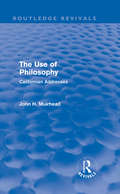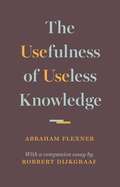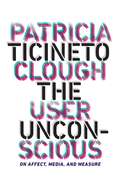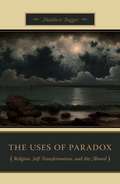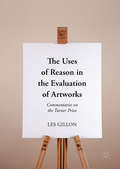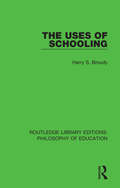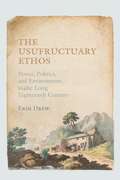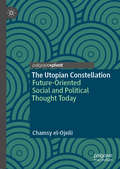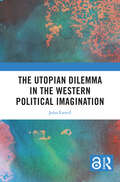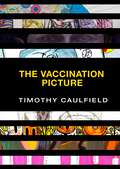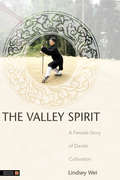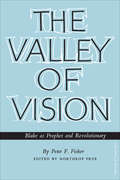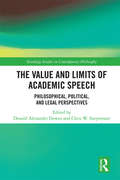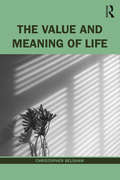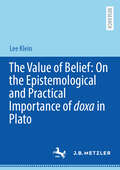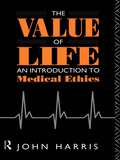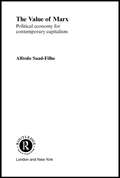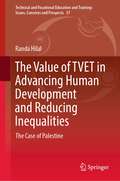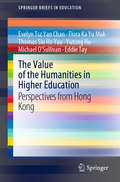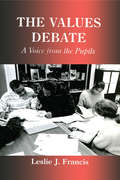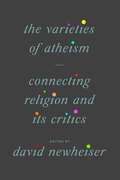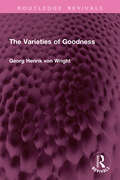- Table View
- List View
The Use of Philosophy: Californian Addresses (Routledge Revivals)
by John H MuirheadFirst published in 1928, this book reproduces the lectures and addresses that John Henry Muirhead gave on various occasions during the two and a half years he spent as Lecturer of Philosophy on the Mills Foundation at the University of California, USA. The different chapters look at the meaning and general place of Philosophy as a subject of study and the application of its leading conceptions to different areas of modern life, including science and politics. The final chapters however, present two short talks of a different nature, which were addressed to Scottish countrymen, gathered on foreign shores. This book outlines Muirhead's philosophical thoughts and conclusions to which he devoted his life.
The Usefulness of Useless Knowledge
by Abraham Flexner Robbert DijkgraafA forty-year tightening of funding for scientific research has meant that resources are increasingly directed toward applied or practical outcomes, with the intent of creating products of immediate value. In such a scenario, it makes sense to focus on the most identifiable and urgent problems, right? Actually, it doesn't. In his classic essay "The Usefulness of Useless Knowledge," Abraham Flexner, the founding director of the Institute for Advanced Study in Princeton and the man who helped bring Albert Einstein to the United States, describes a great paradox of scientific research. The search for answers to deep questions, motivated solely by curiosity and without concern for applications, often leads not only to the greatest scientific discoveries but also to the most revolutionary technological breakthroughs. In short, no quantum mechanics, no computer chips.This brief book includes Flexner's timeless 1939 essay alongside a new companion essay by Robbert Dijkgraaf, the Institute's current director, in which he shows that Flexner's defense of the value of "the unobstructed pursuit of useless knowledge" may be even more relevant today than it was in the early twentieth century. Dijkgraaf describes how basic research has led to major transformations in the past century and explains why it is an essential precondition of innovation and the first step in social and cultural change. He makes the case that society can achieve deeper understanding and practical progress today and tomorrow only by truly valuing and substantially funding the curiosity-driven "pursuit of useless knowledge" in both the sciences and the humanities.
The User Unconscious: On Affect, Media, and Measure
by Patricia Ticineto CloughWide-ranging essays and experimental prose forcefully demonstrate how digital media and computational technologies have redefined what it is to be human Over the past decade, digital media has expanded exponentially, becoming an essential part of daily life. The stimulating essays and experimental compositions in The User Unconscious delve into the ways digital media and computational technologies fundamentally affect our sense of self and the world we live in, from both human and other-than-human perspectives.Critical theorist Patricia Ticineto Clough&’s provocative essays center around the motif of the &“user unconscious&” to advance the challenging thesis that that we are both human and other-than-human: we now live, think, and dream within multiple layers of computational networks that are constantly present, radically transforming subjectivity, sociality, and unconscious processes.Drawing together rising strains of philosophy, critical theory, and media studies, as well as the political, social, and economic transformations that are shaping the twenty-first-century world, The User Unconscious points toward emergent crises and potentialities in both human subjectivity and sociality. Moving from affect to data, Clough forces us to see that digital media and computational technologies are not merely controlling us—they have already altered what it means to be human.
The Uses of Argument
by Stephen E. ToulminA central theme throughout the impressive series of philosophical books and articles Stephen Toulmin has published since 1948 is the way in which assertions and opinions concerning all sorts of topics, brought up in everyday life or in academic research, can be rationally justified. Is there one universal system of norms, by which all sorts of arguments in all sorts of fields must be judged, or must each sort of argument be judged according to its own norms? In The Uses of Argument (1958) Toulmin sets out his views on these questions for the first time. In spite of initial criticisms from logicians and fellow philosophers, The Uses of Argument has been an enduring source of inspiration and discussion to students of argumentation from all kinds of disciplinary background for more than forty years.
The Uses of Paradox: Religion, Self-Transformation, and the Absurd
by Matthew C. BaggerIn this groundbreaking comparative study, Matthew Bagger investigates the role of paradox in Western and Asian religious discourse. Drawing on both philosophy and social scientific theory, he offers a naturalistic explanation of religion's oft-noted propensity to sublime paradox and argues that religious thinkers employ intractable paradoxes as the basis for various techniques of self-transformation. Considering the writings of Kierkegaard, Pseudo-Dionysus, St. John of the Cross, N?g?rjuna, and Chuang-tzu, among others, Bagger identifies two religious uses of paradox: cognitive asceticism, which wields the psychological discomfort of paradox as an instrument of self-transformation, and mysticism, which seeks to transform the self through an alleged extraordinary cognition that ineffably comprehends paradox. Bagger contrasts these techniques of self-transformation with skepticism, which cultivates the appearance of contradiction in order to divest a person of beliefs altogether. Bagger further contends that a thinker's social attitudes determine his or her response to paradox. Attitudes concerning crossing the boundary of a social group prefigure attitudes concerning supposed truths that lie beyond the boundaries of understanding. Individuals who fear crossing the boundary of their social group and would prohibit them tend to use paradox ascetically, while individuals who find the controlled incorporation of outsiders enriching commonly find paradox revelatory. Although scholars have long noted that religious discourse seems to cultivate and perpetuate paradox, their scholarship tends to ratify religious attitudes toward paradox instead of explaining the unusual reaction paradox provokes. A vital contribution to discussions of mystical experience, The Uses of Paradox reveals how much this experience relies on social attitudes and cosmological speculation.
The Uses of Reason in the Evaluation of Artworks: Commentaries on the Turner Prize
by Les GillonThis book uses an examination of the annual Turner Prize to defend the view that the evaluation of artworks is a reason-based activity, notwithstanding the lack of any agreed criteria for judging excellence in art. It undertakes an empirical investigation of actual critical practice as evident within published commentaries on the Prize in order to examine and test theories of critical evaluation, including the ideas of Noel Carroll, Frank Sibley, Kendall Walton and Suzanne Langer. Case studies of work by Turner Prize winners such as Steve McQueen, Martin Creed, Tomma Abts are used to explore definitions of art and concepts of artistic value and meaning. The book will be of interest to academics in the fields of aesthetics, contemporary art and cultural studies, but also to practitioners working in the arts, media and education.
The Uses of Schooling (Routledge Library Editions: Philosophy of Education #5)
by Harry S. BroudyThe Uses of Schooling, first published in 1988, proposes a radically different approach to the evaluation of education. Professor Broudy shows that the common criteria of school effectiveness – that is the ability to replicate the end-of-course performance on examinations or to apply such results – clearly demonstrates the ‘uselessness’ of much of the investment made in schooling. This is so because, unless constantly reinforced by repetition the ability to replace test performance is rapidly diminished after formal school ends. This study will be of interest to students of education.
The Usufructuary Ethos: Power, Politics, and Environment in the Long Eighteenth Century
by Erin DrewAlthough a study of past ideas, The Usufructuary Ethos resonates with contemporary debates about our human responsibilities to the natural world in the face of climate change and mass extinction.
The Utopian Constellation: Future-Oriented Social and Political Thought Today
by Chamsy el-OjeiliThis book examines the utopian dimension of contemporary social and political thought. Arguing for a utopian optic for the human sciences, el-Ojeili claims that major transformations of the utopian constellation have occurred since the end of the twentieth century. Following a survey of major utopian shifts in the modern period, el-Ojeili focuses on three spaces within today’s utopian constellation. At the liberal centre, we see a splintering effect, particularly after the global financial crisis of 2008: a contingent neo-liberalism, a neo-Keynesian turn, and a liberalism of fear. At the far-Right margin, we see the consolidation of post-fascism, a combination of “the future in the past”, elements of the post-modern present, and appeals to a novel future. Finally, at the far-Left, a new communism has emerged, with novel positions on resistance, maps of power, and a contemporary variant of the Left’s artistic critique. The Utopian Constellation will be of interest to scholars and students across the human sciences with an interest in utopian studies, ideological and discourse analysis, the sociology of knowledge, and the study of political culture.
The Utopian Dilemma in the Western Political Imagination
by John FarrellIn this volume, John Farrell shows that political utopias—societies with laws and customs designed to short-circuit the foibles of human nature for the benefit of our collective existence—have a perennial opponent, the honor-based culture of aristocracy that dominated most of the world from ancient times into early modernity and whose status-based competitive psychology persists to the present day. While utopias aim at equality, the heroic imperative defends the need for personal and collective dignity. It asks the utopian, Do we really want to live in a world without struggle, without heroes, and without the stories they create? Because the utopian dilemma pits essential values against each other—equity versus freedom, dignity versus justice—few who confront it can simply take sides. Rather, the dilemma itself has been a generative stimulus for classic authors from Plato and Thomas More to George Orwell and Aldous Huxley. Farrell follows their struggles with the utopian dilemma and with each other, providing a deepened understanding of the moral and emotional dynamics of the western political imagination.
The Vaccination Picture
by Timothy CaulfieldFew topics in health policy have generated as much debate—and frustration—among public health experts as the issue of vaccine safety. Misinformation around the science of vaccination continues to spread, and too often the media fails to report bad science for what it is. Using science-informed analysis alongside original art and powerful essays, health science leader Timothy Caulfield debunks the myths and false assumptions about vaccination safety and effectiveness. Accessible, informative, and entertaining, The Vaccination Picture tells the true story of vaccines, their uses, and their positive effects for everyone.
The Valley Spirit: A Female Story of Daoist Cultivation Second Edition
by Lindsey WeiA young woman, Lindsey Wei, graduates from high school in America and sets out to find her roots in China, questing for who she is and where her life path belongs. She discovers in herself a skill for martial arts and seeks the hidden knowledge of meditation. After three years of study in various martial styles and unveiling false teachers, she is finally led to the ancient Wudang Mountains. Here she meets a Daoist recluse, Li Shi Fu, who has renounced the world of the 'red dust' and long since retired into an isolated temple to cast oracles and read the stars. The coming together of these two extraordinary characters, master and disciple, begins a spiritual relationship taking the young adept on an unforgettable journey through the light and dark sides of modern China and deep into herself. Battling between earthly desires and heavenly knowledge, she makes the transformation into a dynamic and complete woman. A coming-of-age, personal account, the book describes the lived experiences of a profoundly sincere, bitter yet ultimately liberating female quest. It is written for anyone who ponders the true meaning of Chinese wisdom and the way of the Dao in the hope of discovering a deeper strength within themselves.
The Valley of Vision: Blake as Prophet and Revolutionary (University of Toronto Department of English Studies and Texts #9)
by Northrop Frye Peter FisherThe author of this important contribution to the study of Blake was tragically drowned in a sailing accident when he had almost completed it in manuscript. His was a critical mind of singular erudition and power. As is abundantly evidenced in these chapters which Northrop Frye has prepared for publication. Fisher had made a careful study of Oriental philosophy and of Plato and the Neo-Platonists and this background enabled him to make an original and fruitful analysis of his central interest, Blake. The book is not a study of Blake's sources but of his context. The author is trying to answer the question: given Blake's general point of view, why does he make the specific judgments he does make, judgments which so often seem merely glib or petulant or perverse. Blake himself, in explaining a painting, remarked: "It ought to be understood that the Persons, Moses & Abraham, are not here meant, but the States Signified by those Names." Fisher explains what Blake meant by "states," and shows that such names as Plato, Bacon or Newton, or such terms as "priest" or "deist" in Blake's writings, refer not to individuals but to cultural forces in Western civilization, the influence of which accounted for the social conditions that Blake attacked. The attack itself, Fisher shows, was based on a revolutionary dialectic, a sense of the underlying opposition between reactionaries committed to obscurantism and social injustice, the "Elect" as Blake calls them, and the prophets committed to a greater vision (the "Reprobate"), with the mass of the public (the "Redeemed") in between.
The Value and Limits of Academic Speech: Philosophical, Political, and Legal Perspectives (Routledge Studies in Contemporary Philosophy)
by Donald Alexander Downs Chris W. SurprenantFree speech has been a historically volatile issue in higher education. In recent years, however, there has been a surge of progressive censorship on campus. This wave of censorship has been characterized by the explosive growth of such policies as "trigger warnings" for course materials; "safe spaces" where students are protected from speech they consider harmful or distressing; "micro-aggression" policies that often strongly discourage the use of words that might offend sensitive individuals; new "bias-reporting" programs that consist of different degrees of campus surveillance; the "dis-invitation" of a growing list of speakers, including many in the mainstream of American politics and values; and the prominent "shouting down" or disruption of speakers deemed inconsistent with progressive ideology. Not to be outdone, external forces on the right are now engaging in social media bullying of speakers and teachers whose views upset them. The essays in this collection, written by prominent philosophers, political scientists, sociologists, and legal scholars, examine the issues at the forefront of the crisis of free speech in higher education. The contributors address the broader historical, cultural, legal, and normative contexts of the current crisis, and take care to analyze the role of "due process" in protecting academic freedom and individuals accused of misconduct. Additionally, the volume is unique in that it advances practical remedies to campus censorship, as the editors and many of the contributors have participated in movements to remedy limitations on free speech and open inquiry. The Value and Limits of Academic Speech will educate academic professionals and informed citizens about the phenomenon of progressive censorship and its implications for higher education and the republic.
The Value and Meaning of Life
by Christopher BelshawIn this book Christopher Belshaw draws on earlier work concerning death, identity, animals, immortality, and extinction, and builds a large-scale argument dealing with questions of both value and meaning. Rejecting suggestions that life is sacred or intrinsically valuable, he argues instead that its value varies, and varies considerably, both within and between different kinds of things. So in some cases we might have reason to improve or save a life, while in others that reason will be lacking. What about starting lives? The book’s central section takes this as its focus, and asks whether we ever have reason to start lives, just for the sake of the one whose life it is. Not only is it denied that there is any such reason, but some sympathy is afforded to the anti-natalist contention that there is always reason against. The final chapters deal with meaning. There is support here for the sober and familiar view that meaning derives from an enthusiasm for, and some success with, the pursuit of worthwhile projects. Now suppose we are immortal. Or suppose, in contrast, that we face imminent extinction. Would either of these threaten meaning? The claim is made that the force of such threats is often exaggerated. The Value and Meaning of Life is essential reading for students and researchers in philosophy, ethics, and religion, and will be of interest to all those concerned with how to live, and how to think about the lives of others.
The Value of Belief: On the Epistemological and Practical Importance of doxa in Plato
by Lee KleinAs the first monograph to specifically focus on the positive evaluation of belief (doxa) as a crucial concept in Plato&’s epistemology, this work contributes significantly to scholarly research by offering a fresh perspective that deepens our understanding of Plato&’s theory of knowledge. It shows that doxa is indispensable to the acquisition of knowledge in the human life, thus disproving the long-held notion that Plato was a mere idealist in this respect.The author examines the nuanced, multifaceted role of belief in a well-chosen selection of Platonic dialogues (Meno, Republic, Theaetetus, Philebus, and Timaeus), challenging traditional as well as modern interpretations by letting belief step out of the shadow of knowledge. By offering detailed analyses of relevant arguments, engaging with previous research and providing an innovative interpretation, it is shown that doxa is not only a central but a highly versatile concept in Plato.This study appeals especially to scholars of ancient philosophy and epistemology as well as to all students of philosophy interested in Plato and epistemology.
The Value of Life: An Introduction to Medical Ethics
by John HarrisFirst published in 1985. Routledge is an imprint of Taylor & Francis, an informa company.
The Value of Marx: Political Economy for Contemporary Capitalism (Routledge Frontiers Of Political Economy Ser. #41)
by Alfredo Saad FilhoKarl Marx's writings provide a uniquely insightful explanation of the inner workings of capitalism, which other schools of thought generally have difficulty explaining. From this vantage point, Marx's works can help to explain important features and economic problems of our age, and the limits of their possible solutions. For example, the necessity
The Value of TVET in Advancing Human Development and Reducing Inequalities: The Case of Palestine (Technical and Vocational Education and Training: Issues, Concerns and Prospects #37)
by Randa HilalThis book examines the contribution of Vocational Education and Training to advancing human development and reducing inequality. It uses the example of Palestine as case-study rich in multi-layered inequalities, some of which are experienced in the region and worldwide, while others are specific to adverse conditions. The case of Palestine provides fertile ground for understanding inequality and human development, and for echoing the developed knowledge through to the understanding of Vocational Education and Training and Human Development globally. The book brings original theoretical approaches, evidence of the value of Vocational Education and Training, and contributes to academic debates, as well as provides empirical evidence for practitioners and donor community.
The Value of the Humanities in Higher Education: Perspectives from Hong Kong (SpringerBriefs in Education)
by Eddie Tay Michael O'Sullivan Evelyn Tsz Chan Flora Ka Mak Thomas Siu Yau Yutong HuThis book presents an extensive analysis of the multifaceted benefits that higher education in the humanities offers individuals and society, as explored in the context of Hong Kong. Using both quantitative graduate employment survey data and qualitative data from interviews with past humanities graduates and with leading humanities scholars, the study provides an objective picture of the “value” of humanities degrees in relation to the economic needs and growth of Hong Kong, together with an in-depth exploration of their value and use in the eyes of humanities graduates and practitioners. Therefore, although it is hardly the only book on the value and status quo of the humanities worldwide, it nonetheless stands out in this crowded field as one of the very few extended studies that draws on empirical data.The book will appeal to both an academic and a wider audience, including members of the general public, non-academic educators, and government administrators interested in the status quo of humanities education, whether in Hong Kong or elsewhere. The report also includes a wealth of text taken directly from interviews with humanities graduates, who share their compelling life stories and views on the value of their humanities education.
The Values Debate: A Voice from the Pupils (Woburn Education Series)
by Leslie J. FrancisPresents findings from a survey conducted among 30,000 13-15 year olds throughout England and Wales, giving particular attention to social, personal and moral issues.
The Varieties of Atheism: Connecting Religion and Its Critics
by David NewheiserThoughtful essays to revive dialogue about atheism beyond belief. The Varieties of Atheism reveals the diverse nonreligious experiences obscured by the combative intellectualism of Sam Harris, Richard Dawkins, and Christopher Hitchens. In fact, contributors contend that narrowly defining atheism as the belief that there is no god misunderstands religious and nonreligious persons altogether. The essays show that, just as religion exceeds doctrine, atheism also encompasses every dimension of human life: from imagination and feeling to community and ethics. Contributors offer new, expansive perspectives on atheism’s diverse history and possible futures. By recovering lines of affinity and tension between particular atheists and particular religious traditions, this book paves the way for fruitful conversation between religious and non-religious people in our secular age.
The Varieties of Atheism: Connecting Religion and Its Critics
by David NewheiserThoughtful essays to revive dialogue about atheism beyond belief. The Varieties of Atheism reveals the diverse nonreligious experiences obscured by the combative intellectualism of Sam Harris, Richard Dawkins, and Christopher Hitchens. In fact, contributors contend that narrowly defining atheism as the belief that there is no god misunderstands religious and nonreligious persons altogether. The essays show that, just as religion exceeds doctrine, atheism also encompasses every dimension of human life: from imagination and feeling to community and ethics. Contributors offer new, expansive perspectives on atheism’s diverse history and possible futures. By recovering lines of affinity and tension between particular atheists and particular religious traditions, this book paves the way for fruitful conversation between religious and non-religious people in our secular age.
The Varieties of Atheism: Connecting Religion and Its Critics
by David NewheiserThoughtful essays to revive dialogue about atheism beyond belief. The Varieties of Atheism reveals the diverse nonreligious experiences obscured by the combative intellectualism of Sam Harris, Richard Dawkins, and Christopher Hitchens. In fact, contributors contend that narrowly defining atheism as the belief that there is no god misunderstands religious and nonreligious persons altogether. The essays show that, just as religion exceeds doctrine, atheism also encompasses every dimension of human life: from imagination and feeling to community and ethics. Contributors offer new, expansive perspectives on atheism’s diverse history and possible futures. By recovering lines of affinity and tension between particular atheists and particular religious traditions, this book paves the way for fruitful conversation between religious and non-religious people in our secular age.
The Varieties of Goodness (Routledge Revivals)
by Georg Henrik von WrightFirst published in 1963, Varieties of Goodness presents analysis of the concept of value and its relations with the neighbouring concepts of fact and norm. The author discusses important themes such as instrumental and technical goodness; utilitarian goodness; goodness of faculties; active and passive pleasure; ethical hedonism; ideals of happiness; divisions of the virtues; connection between values and norms; concept of duty; and justice. This is a must read for scholars and researchers of philosophy.
